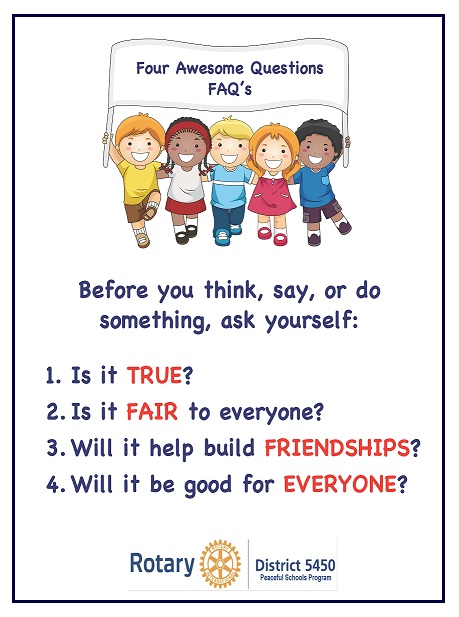PROGRAMS COMBINE TO SERVE CHILDREN AND YOUTH

The Peaceful Schools and 4-way programs have combined to provide age appropriate and effective methods to introduce and discuss the 4-way test to children and youth at each stage of childhood development.
ELEMENTARY (Grades 1-3) – Peaceful Schools Program
At this stage of development (ages 6-8) we want to teach young children to think outside of themselves, to recognize how their behaviors affect other people and to understand the consequences of what they say or do. We have simplified the language of the 4-way test (with Rotary International’s approval) into the FOUR AWESOME QUESTIONS:
Before you think, say or do something, ask yourself: • Is it true? • Is it fair to everyone? • Will it help build friendships? • Will it be good for everyone?
The Four Awesome Questions (FAQs) are simple and straight forward and easily understood by this age group. The FAQs are the foundation of the Peaceful Schools Program.
Peaceful Schools Program:
The Peaceful Schools Program curriculum is built around the FAQs and with four lesson plans and each lesson focused on one of following social and emotional skills: expressing feelings; building community; celebrating diversity; and resolving conflict.
The Peaceful Schools Program (PSP) is a classroom-based program, sponsored by a Rotary Club, delivered in elementary school classrooms (grades 1, 2, and/or 3), by high school students who are trained by Rotarians to effectively teach the program. While Rotarians can also teach this program in the classroom, high school students are ideal in that the elementary students respond extremely well to them and the high school students gain immeasurable benefits from the program as well. (See section 3 below.)
Each of the 4 classroom sessions (and corresponding lesson plan) includes the reading and discussion of a children’s story that illustrates the lesson concept, activities that demonstrate the lesson concept, and music that inspires the children to internalize these lessons. To learn more about the Peaceful Schools Program visit our website at peacefulschoolsprogram.com.
FAQ Books:
The Peaceful Schools Program has created five pocket-size books to further inform young children about the 4-Way Test. This 5-book set is an extension of the Peaceful Schools program to:
1. Augment the classroom-based Peaceful Schools Program with books that the children can keep, read and refer to repeatedly, and share with their friends and family.
2. Provide an alternative method for teaching the lessons of the Peaceful Schools Program, foster literacy, and promote Rotary and Rotary’s guiding principles anywhere in the world. These 5-book sets can be viewed and purchased online through the website uniteforcommongood.com. They are also available in Spanish.
MIDDLE SCHOOL (grades 6-8) - The 4-way Test Program
At this stage of development (ages 11-13), we want to encourage critical thinking by introducing real-life situations to these young students and guiding them in how to use the 4-way test to make everyday decisions. The focus is on understanding how their decisions and decision-making process lead to real-life consequences. This program is taught by Rotarians who are trained to work with this impressionable and vulnerable age group. Both Rotarians, and the students themselves, propose the real-life situations, with care being taken to avoid potentially painful or harmful topics.
HIGH SCHOOL (grades 10-12) – Student Mentors for the Peaceful Schools Program
Our objective for older students (ages 14-17) is for them to internalize the 4-way test and understand that their decisions impact not just them, but many others around them. Their real-life situations tend to be more complex, with potentially far-reaching consequences, often impacting the direction of their life.
Engaging these students as mentors for the elementary students through the Peaceful Schools Program is an excellent way to accomplish these objectives. The program requires them to assess their own values, explain the 4-way test and its meaning to young children, examine the program’s stories using the 4-way test, recognize the influence they have as role models to these younger students, and accept responsibility for their words and actions.
As these students come to understand the impact their decisions have on not only themselves, but on others, they also become aware of the potentially life-changing consequences of their decisions, for better or for worse. This is an appropriate time to introduce these young people to other important social and emotional issues such as mental health and to provide them with effective tools for dealing with these issues such as mental health first-aid. This is an opportunity for Rotary’s Mental Health Initiative.